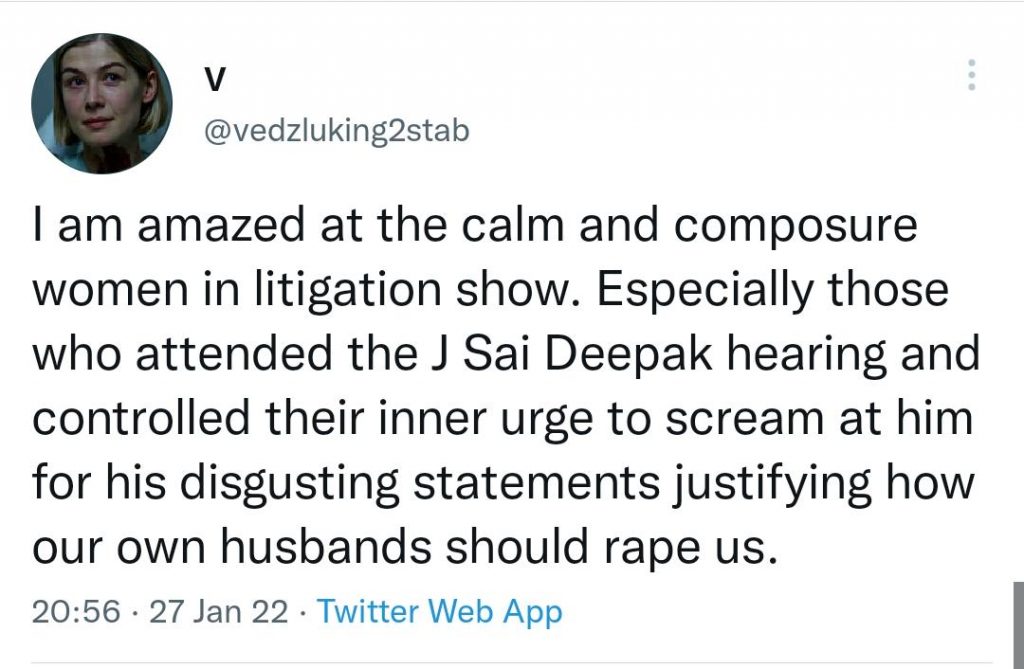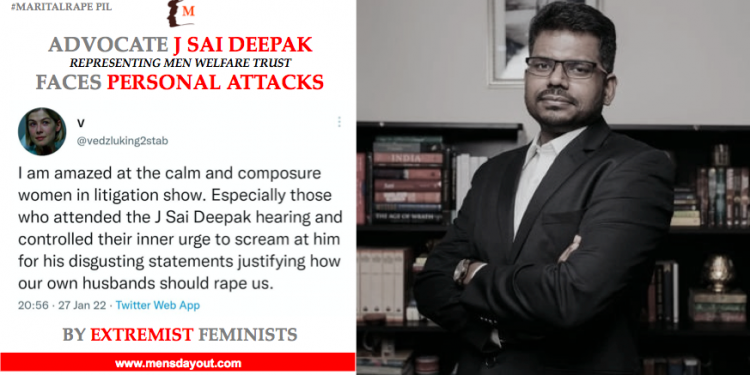The Delhi High Court on Friday continued hearing a batch of petitions challenging the exception to Section 375 of the Indian Penal Code, which exempts forceful sexual intercourse by a man with his own wife from the offence of rape.
Advocate J Sai Deepak representing Men Welfare Trust on Thursday and Friday concluded the rejoinder submissions opposing the criminalisation of marital rape before a bench of Justice Rajiv Shakdher and Justice C Hari Shankar.
During the hearing, while advocate J Sai Deepak said that the Men Welfare Trust has been receiving flak for their stand, Advocate Karuna Nundy, appearing for the opposite side, said that she allegedly received rape threats.
However, now the attacks from Men’s Rights Activists have been shifted to Deepak, for representing the NGO defending against Criminalisation of Marital Rape Law. This completely exposes the hypocrisy of Freedom of Speech champions who are targeting a lawyer for merely representing the other side in a highly sensitive matter.
This dangerous trend has been prevailing since a long time, where not just social media, but also section of mainstream media attacks anyone who has an alternate view in Gender Debates.
One of the tweets, which now stands deleted, read as below:
I am amazed at the calm and composure women in litigation show especially those attended the J Sai Deepak hearing and controlled their inner urge to scream at him for his disgusting statements justifying how our own husbands should rape us.

As Deepak is now being attacked personally, he took to twitter and shared an extremely calm and dignified message for all the haters, trolls and perhaps even planted moles. Deepak quoted:
I have no issues whatsoever with people from any side having issues with what I stand for or what they think I stand for. Where I draw the line is on terms of engagement, platform for engagement & civility in engagement. I don’t equate passionate yet civil disagreement with personal malice.
I think SM in general & Twitter in particular encourages a certain degree of brashness of which I too have been guilty often. It helps to realise that there is life outside of Twitter & life is unpredictable. You never know who you might end up meeting under what circumstance.
Especially if you happen to be in your late teens and early twenties, do not let social media encourage a false sense of bravado. You have a life ahead of you and not everyone can be expected to be accommodative of brash behaviour. Find civil ways of expressing disagreement. Be conscious of the fact that exposure to a subject in the confines of an academic campus is very different from how it plays out outside of it. This is certainly true of the law. Idealism is welcome and must be welcomed. Just don’t let it cloud your rational & reasonable side.
If there is a temptation to quip wisecracks for the consumption of your peers or to win the approval of whichever gender you are attracted to, ideally try not to succumb to it. But if you still wish to, at least realise that a public platform isn’t the best place for it.
It is easy to resort to cheap language or snide or sly behaviour. But I don’t think being civil is difficult either. And the best part is that it makes your brash opponents look immature and juvenile. So strategically too, it makes sense to be civil and it has worked for me.
Twitter may give the impression that people are strictly segregated on the lines of labels imputed here. Thankfully, and fortunately, life isn’t this segregated and there is much more room for understanding & evolution. It’s in our interest to realise it, or learn it d hard way.
Not for a moment am I suggesting any dilution in principles & beliefs nor am I an Ahimsavadi. My point is limited – choose your battles, let ur response reflect +vely on your culture & upbringing, but should someone equate your civility with weakness, reveal the iron fist under the kid gloves.
After all, the Kautilyan Upayas are Sama, Dana/Dama, Bheda and finally Danda. Escalate the nature of response only when necessary while preserving your innate dignity and when finally Danda is meted out, be clinical and professional. Finish the job thoroughly and set an example.
Jai Shri Ram. Vande Mataram.
Submissions by Men Welfare Trust Represented By J Sai Deepak
Deepak began last week’s submissions at Delhi High Court by clarifying the stand of Men Welfare Trust by arguing that the entity was not against the legal recognition of spousal sexual violence. He added that its focus has been on three aspects:
- Regarding proper forum
- Whether existing law is inadequate
- On gender neutrality in which the law is moving
Sai submitted that the fact that the petitioners have challenged exception 2 of Section 375, Section 376B of IPC and Section198B of CrPC, shows that they were aware of the existence of specific and special treatment in the legislation, the basis of which is the existence of marriage. He submitted,
So when there exists a very specific reason which forms the basis of the provisions and there is a consistent treatment meted out from the institution across the Code, they have just established a case against themselves which is to say that there is an intelligible differentia and there is no manifest arbitrariness.
He added that when the Code creates an ecosystem based on certain provisions, both under the IPC and Domestic Violence Act, it is proof of the existence of a very specific logic and rationale. The exception can’t be held to be “manifestly arbitrary” or “capricious” so to invalidate it on the ground of violation of Article 14. As reported by Livelaw, Deepak further said,
So the position is, there is a logic to which we disagree with but that disagreement does not rise to the level of unconstitutionality.
Domestic Violence Act, 2005
Deepak then referred to Section 3 of the Domestic Violence Act which provides for the definition of domestic violence. Reading the said definition, Deepak submitted that the Act includes sexual abuse which is defined specifically under the Act.
According to the definition, sexual abuse means “any act or conduct which is of such a nature as to cause bodily pain, harm, or danger to life, limb, or health or impair the health or development of the aggrieved person and includes assault, criminal intimidation and criminal force.”
Remedies Civil not Criminal Under DV Act
Addressing the petitioners’ contention that the Act is inadequate in terms of the forum that the victim has access to and the remedies are primarily civil in nature, Deepak referred to Section 19(2) of the Act which deals with the provision of residence orders being passed by the Magistrate.
Under Sec. 19(2) of the Act, it has been stated that the Magistrate may impose any additional conditions or pass any other direction which he may deem reasonably necessary to protect or to provide for the safety of the aggrieved person or any child of such aggrieved person. Deepak submitted,
Typically under sec. 19(2), based on what is known as the Domestic incident report, FIRs are registered either under Section 498A and some under Section 376B of IPC, and there is a reason for this. Section 376B which speaks of sexual intercourse without consent between former husband and a wife speaks of decree of separation or otherwise.
Therefore, based on DIR, it is possible for the Magistrate to come to the conclusion that even if there exists no decree of separation which declares formal separation between parties, if the history of relationship based on the report reveals de facto separation, even if they share the same bed and same home and live under same roof, it is possible for a Section 376B to be registered.
On the absence of remedy as being pushed by petitioners, Deepak shared,
It is not a question of absence of remedy, it is a question of perception with respect to the adequacy of remedies, which again does not fall under the realm of unconstitutionality.
He further submitted that when there are pluralities of reasons sought to be taken and legislature takes the call that marriage as an institution is to be protected through consistent treatment in IPC, the same cannot be interfered with by the Court. He submitted,
Immunity that is provided under exception 2 to sec. 375 is to protect the civil liberties of a husband. Thanks to the nature of the relationship. Therefore, Courts must try and protect the provision which protects civil liberty taking into account the nature of the institution as opposed to taking away that immunity which will have the effect of shrinking of civil liberty.
UK Law & Foreign Countries Comparison
Deepak concluded by referring to the Parliamentary Committee Report which dealt with Section 375 of IPC and international position, specifically UK law on the subject.
At the end of the hearing, ASG Chetan Sharma appearing for the Centre requested that the petitioners may rejoin making submissions after Central Government makes its stand before the Court. Justice Shakdher remarked,
12 days have already passed. We will hear them, what to do now. Whenever you want to come…we are hearing them because you need time.We will hear others and we’ll do what has to be done. We want to hear you.
On a query put forth by Advocate Karuna Nundy, the Court asked Sharma to take instructions if the Central Government would still stick to its earlier stand in terms of previous written submissions and affidavit filed in the matter, or its latest stand that it is seeking suggestions from stakeholders to revisit the issue.
The matter will now be heard on Monday when Senior Advocate Colin Gonsalves will begin rebuttal arguments on behalf of one of the petitioners.
Earlier, Advocate RK Kapoor representing NGO Hridey had submitted that sexual intercourse between a husband and his wife in a marital relationship cannot be labelled as rape and at worst, can only be called a sexual abuse. He said that the said fact would be clear from the definition of cruelty as defined under the Domestic Violence Act 2005.
Previously, Senior Advocate Rebecca John appearing as amicus curiae in the matter concluded her submissions. She submitted that the retention of exception 2 of Section 375 of IPC will not be constitutional.
John had also submitted that availability of other provisions in various legislations including Sections 498A, 304B of IPC, Domestic Violence Act and other civil remedies, are insufficient to deal with the offence of rape under Section 375, as regards to a wife alleging rape by her husband.
The petitions against marital rape have been filed by NGOs RIT Foundation, All India Democratic Women’s Association and two individuals.
Reporting of legal proceedings have been edited from Livelaw.
MUST WATCH –
Men’s Day Out Response To Chomu Akash Banerjee On Marital Rape Law
ALSO READ –
If Judiciary Crosses Line, It Would Become Very Dangerous Precedent | J Sai Deepak Argues Against Criminalisation Of Marital Rape
Marital Rape PIL | Read Written Submissions By Advocate Raj Kapoor For Hridey NGO, & Men Welfare Trust
Raped By Our Wives Without Consent; Why Is Marital Rape Debate Not Gender Neutral?
UPA-II Had Rejected Recommendation Of Justice Verma Committee To Make Marital Rape An Offence
Join our Facebook Group or follow us on social media by clicking on the icons below
If you find value in our work, you may choose to donate to Voice For Men Foundation via Milaap OR via UPI: voiceformenindia@hdfcbank (80G tax exemption applicable)






























